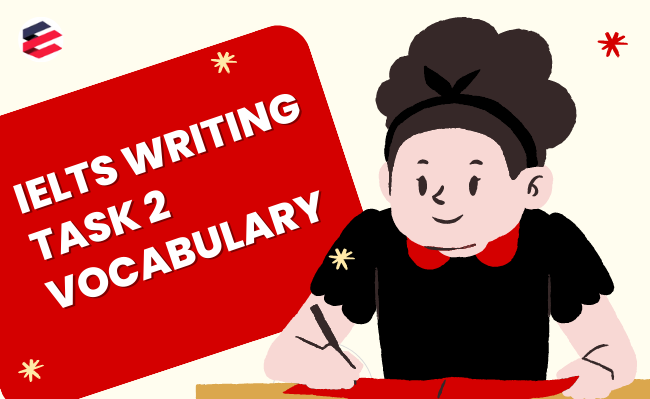IELTS Writing Task 2 Vocabulary – Advanced words for learners
The art of effective communication lies at the heart of IELTS Writing Task 2, and a well-crafted vocabulary serves as a key to unlocking its potential. This compilation of vocabulary offers a comprehensive toolkit to enhance the quality and depth of your essay responses.
From thought-provoking introductions to seamlessly connected paragraphs, and impactful conclusions, this vocabulary enriches every aspect of your writing. It equips you with the means to express intricate ideas, substantiate arguments, and navigate through the intricacies of diverse topics. By integrating the IELTS writing task 2 vocabulary, you empower yourself to articulate your thoughts with precision and clarity, elevating your IELTS Task 2 performance.

1. What is on the IELTS writing task 2?
IELTS Writing Task 2 is an essay-writing task that assesses your ability to present and support an argument or opinion on a given topic. In this task, you are required to write a coherent and well-structured essay of at least 250 words.
The task typically presents a statement or question related to a social, cultural, or contemporary issue. Your goal is to express your opinion, provide relevant examples, and support your arguments with reasons and evidence. You must address all aspects of the task, present a clear position, and offer a balanced discussion of the topic. Your essay should have an introduction, body paragraphs with supporting points, and a conclusion. The task aims to evaluate your writing skills, including your ability to organize ideas, use appropriate vocabulary and grammar, and present a well-reasoned argument.
2. IELTS writing task 2 vocabulary
2.1. IELTS writing task 2 vocabulary – introduction
Certainly, here are some vocabulary and phrases that can be useful when writing the introduction for IELTS Writing Task 2:
- The issue/topic under discussion is: Introduce the main subject of the essay.
- In today’s modern society/world: Set the context for the discussion.
- It is a well-known fact that: Begin with a common knowledge statement.
- Nowadays/Currently: Indicate the present time frame.
- In recent years/decades: Introduce a time period relevant to the topic.
- There is ongoing debate/discussion about: Highlight that the topic is a subject of contention.
- One of the most controversial topics is: Introduce a contentious subject.
- With the advent of technology/advancements in science: Mention technological or scientific advancements relevant to the topic.
- The concept/idea of [topic] has garnered significant attention: Highlight the relevance and attention the topic has received.
- The purpose of this essay is to discuss/analyze/examine: Specify the purpose of your essay.
- This essay will explore various aspects of [topic]: Indicate that you will cover different facets of the topic.
- This essay will delve into the implications of [topic]: Mention that you will discuss the consequences or effects.
- This essay will critically evaluate the argument that: Specify that you will critically assess a particular argument.
- It is worth noting that: Draw attention to an important detail.
- The aim/objective of this essay is to: Clearly state your objective.
- This essay intends to shed light on: Indicate your intention to provide insight.
- This essay aims to address the question of: Specify the question you will address.
- The following paragraphs will discuss/analyze: Preview the content of your essay.
- This essay will consider both sides of the argument: Indicate a balanced approach.
- In the subsequent sections, the arguments for and against [topic] will be examined: Outline your approach to analyzing arguments.
Remember, the introduction is your chance to set the tone for your essay and clearly state your position or approach. Utilize these vocabulary items appropriately to craft an engaging and informative introduction for your IELTS Writing Task 2 essay.

2.2. IELTS writing task 2 vocabulary – paragraphs
Certainly, here’s a list of vocabulary and phrases that can be useful when writing paragraphs in IELTS Writing Task 2:
Introducing Your Point:
- First and foremost: Begin a paragraph by introducing a primary point.
- To begin with: Start discussing a new aspect of the topic.
- One key aspect to consider is: Introduce an important point.
- A significant factor to note is: Highlight an essential element.
- Another crucial point is: Introduce another important point.
- Presenting Examples and Evidence:
- For instance: Provide an example to support your point.
- As an illustration: Introduce an example to clarify your argument.
- To exemplify this: Present evidence or an example.
- As evidence suggests: Use evidence to strengthen your argument.
- Supporting this, [quote/refer to source]: Use a reference or quote to validate your point.
Contrasting Ideas:
- On the other hand: Introduce a contrasting viewpoint or argument.
- However, it’s important to consider: Acknowledge a counterargument.
- Despite this, it’s essential to recognize: Address opposing viewpoints.
- Nevertheless: Transition to a contrasting perspective.
- Providing Analysis and Explanation:
- This can be attributed to: Explain the cause of a certain phenomenon.
- This is indicative of: Explain the significance of an observation.
- This phenomenon can be explained by: Provide a rational explanation.
- The reason behind this is: Explain the underlying cause.
Concluding a Point:
- In conclusion: Sum up the main idea of the paragraph.
- To sum up: Provide a concise summary of the point.
- In summary: Present a brief overview of the discussion.
- As a result: Show the consequence of the discussed point.
Transitioning to the Next Point:
- Moving on to the next point: Transition to a new aspect of the topic.
- Turning to the second/main point: Shift focus to another key point.
- Next, let’s consider: Introduce the next point for discussion.
Remember to use these vocabulary items appropriately to structure your paragraphs coherently and effectively. Each paragraph should present a clear point, support it with examples or evidence, and contribute to the overall flow of your IELTS Writing Task 2 essay.
2.3. IELTS writing task 2 vocabulary – conclusion
Here’s a list of vocabulary and phrases that can be useful when writing the conclusion for IELTS Writing Task 2:
Summarizing Main Points:
- In summary: Present a concise summary of the key points discussed.
- To sum up: Provide an overview of the main arguments.
- Overall: Offer a general reflection on the topic.
- Taking everything into account: Consider all aspects discussed.
- Reiterating Your Position:
- In conclusion: Introduce your final thoughts on the topic.
- To conclude: Present your final viewpoint or stance.
- Ultimately: State the ultimate outcome or perspective.
Providing a Balanced View:
- While both sides have valid points: Acknowledge the validity of different perspectives.
- Balancing the arguments: Show that you’ve considered multiple viewpoints.
- In considering these aspects: Highlight the importance of considering all aspects.
Reflecting on Implications:
- This has implications for: Discuss the broader consequences of the topic.
- The implications of this are significant: Highlight the importance of your discussion.
- This highlights the importance of: Emphasize the relevance of the topic.
Making a Final Assertion:
- In light of these arguments, it is evident that: Present a clear conclusion based on the arguments.
- It is clear that: Express a straightforward conclusion.
- It can be concluded that: Provide a statement of finality.
Offering a Call to Action or Future Consideration:
- This issue demands further consideration: Suggest that the topic requires ongoing attention.
- It is essential that we: Present a call to action or recommendation.
- As we move forward, it’s crucial to: Suggest future considerations.
Ending on a Thoughtful Note:
- Food for thought: Offer something for the reader to reflect upon.
- The topic prompts us to ponder: Encourage deeper reflection on the topic.
- The topic remains a subject of ongoing discourse: Indicate that the conversation continues.
Remember to use these vocabulary items appropriately to craft a strong conclusion that effectively summarizes your main points and leaves a lasting impression on the reader. A well-structured conclusion should restate your position, recap key arguments, and potentially suggest future implications or considerations.
>> Read more on: IELTS Writing Task 1 Vocabulary
3. IELTS writing task 2 advanced vocabulary
Check out now the list of advanced vocabulary that you can use in IELTS Writing Task 2 to enhance the sophistication of your language and express your ideas more eloquently:
3.1. Introduction
- In the contemporary era: In the modern age.
- A prevailing trend: A dominant pattern.
- A multifaceted issue: A complex and multi-dimensional problem.
- An intricate dilemma: A complicated challenge.
- A pertinent concern: A relevant issue.
3.2. Presenting Arguments
- Substantiating this viewpoint: Providing substantial evidence for this perspective.
- It is imperative to acknowledge: It is crucial to recognize.
- It can be surmised that: It can be inferred that.
- This conjecture is underscored by: This assumption is supported by.
- A compelling case can be made for: A strong argument can be formulated in favor of.
3.3. Counterarguments and Refutation
- It is not unfounded to assert: It is not without reason to claim.
- While this holds true to a certain extent: Although this is valid up to a point.
- It must be conceded that: It should be acknowledged that.
- However, this notion is counterbalanced by: Nevertheless, this idea is counteracted by.
- Yet, it is pertinent to consider: However, it is relevant to take into account
3.4. Providing Examples and Evidence
- To illustrate this concept: To clarify this idea.
- An exemplar of this can be seen in: A prime example of this can be observed in.
- This is substantiated by empirical data: This is supported by factual information.
- A notable instance is: A significant case is.
- Statistical evidence underscores: Statistical data emphasizes
3.5. Emphasizing Importance and Consequences
- It bears profound implications for: It has significant consequences for.
- This phenomenon engenders a ripple effect: This occurrence generates a chain reaction.
- The ramifications are far-reaching: The consequences extend widely.
- This factor carries considerable weight: This element holds significant importance.
- This issue is fraught with potential ramifications: This topic is filled with possible consequences.
Remember that while advanced vocabulary can enhance your writing, it’s essential to use it appropriately and ensure that your sentences remain clear and coherent. Strive for clarity, precision, and coherence in your writing to effectively convey your ideas to the reader. Practice IELTS writing part 2 now!

4. IELTS writing task 2 vocabulary – Linking Words, Phrases, and Paraphrasing
Here’s a list of linking words, phrases, and paraphrasing techniques that can enhance the coherence and cohesion of your IELTS Writing Task 2 essay:
Linking Words and Phrases:
- Additionally: Furthermore, besides.
- Moreover: Furthermore, what’s more.
- In addition to: Besides, as well as.
- Furthermore: Moreover, additionally.
- On the other hand: Conversely, in contrast.
- However: Nevertheless, nonetheless.
- Nonetheless: However, still.
- In contrast to: Unlike, in comparison.
- Similarly: Likewise, in the same way.
- Likewise: Similarly, in a similar vein.
- Consequently: As a result, therefore.
- As a result: Hence, thus.
- Therefore: Consequently, accordingly.
- In conclusion: To sum up, ultimately.
- To summarize: In brief, in short.
Paraphrasing Techniques:
- Rewording with Synonyms: Replace words with similar meanings.
- Using Different Grammatical Structures: Change sentence structures while retaining the meaning.
- Changing Verb Tenses: Modify verb tenses to convey the same information.
- Using Passive Voice: Shift from active to passive voice or vice versa.
- Altering Word Forms: Change nouns to verbs or adjectives to adverbs, and vice versa.
- Replacing Clauses: Transform complex clauses into simpler ones.
- Adjusting Word Order: Rearrange words without changing the meaning.
- Adding Modifiers: Include adjectives, adverbs, or phrases to elaborate.
- Substituting Part of the Sentence: Replace a phrase or clause while maintaining context.
- Expanding or Condensing: Elaborate on a point or condense information.
These linking words, phrases, and paraphrasing techniques are instrumental in creating a smooth flow between ideas and expressing yourself more effectively in your IELTS Writing Task 2 essay. Remember to use them judiciously, ensuring your writing remains coherent and easily comprehensible.
Mastering a diverse and advanced vocabulary is pivotal to excelling in IELTS Writing Task 2. This collection of vocabulary empowers candidates to craft introductions that captivate, paragraphs that seamlessly connect ideas, and conclusions that leave a lasting impact.
In conclusion, mastering a diverse and sophisticated vocabulary is an indispensable tool for excelling in the IELTS Writing Task 2. The ability to express your thoughts with precision and nuance not only enhances the clarity of your arguments but also portrays a strong command of the English language. By incorporating a wide range of vocabulary, from synonyms and idiomatic expressions to advanced academic terminology, you can elevate the quality of your essay and impress the examiners. Let’s do IELTS practice test today to get 9.0 IELTS!!